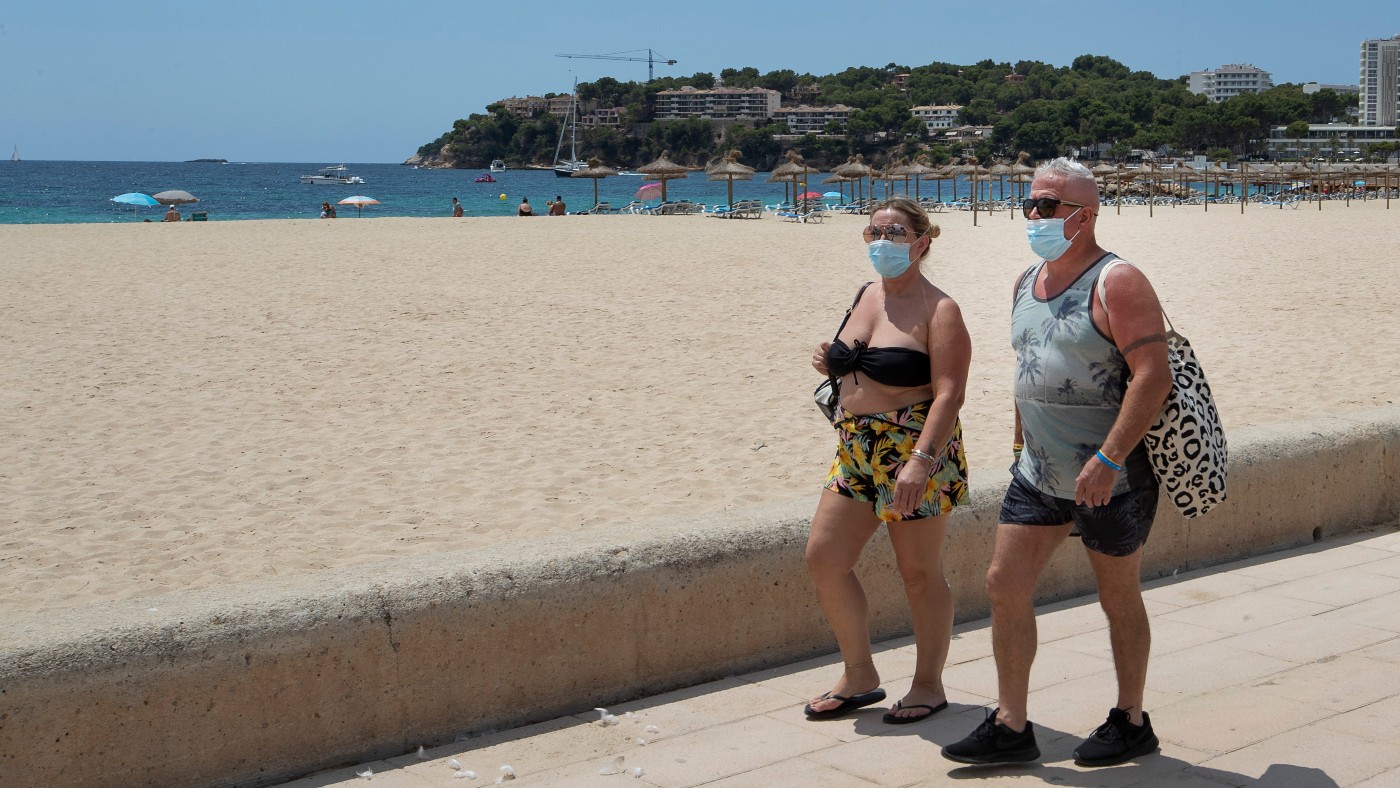Should the UK be worried about the Beta variant in Spain and France?
The resurgence of the South African variant in two popular holiday destinations will be a concern for the UK government

A free daily email with the biggest news stories of the day – and the best features from TheWeek.com
You are now subscribed
Your newsletter sign-up was successful
Tara Hurst, a lecturer in biomedical science at Birmingham City University, on the threat posed by a Covid strain first discovered in South Africa
Most of the world, the UK included, is currently grappling with the Delta variant of the coronavirus. But in parts of Europe there has also been a resurgence of an earlier variant of concern: Beta (B1351). First discovered in South Africa, it has since dispersed globally, but hasn’t yet gained a good foothold in the UK.
The picture is different for France and Spain, however. On GISAID – a database that collates genetically sequenced Covid-19 samples from around the world – 14.2% of Spanish submissions and 1.9% of French submissions over the past four weeks have been Beta variant samples. For Spain, the total number of recorded Beta cases on the database has nearly doubled during this period.
The Week
Escape your echo chamber. Get the facts behind the news, plus analysis from multiple perspectives.

Sign up for The Week's Free Newsletters
From our morning news briefing to a weekly Good News Newsletter, get the best of The Week delivered directly to your inbox.
From our morning news briefing to a weekly Good News Newsletter, get the best of The Week delivered directly to your inbox.
Across the rest of Europe there have been barely any cases, with only two new British Beta samples being logged over the past month (Spain has logged 378). But the resurgence of this variant so close to British shores, in two countries that are popular holiday destinations for people from the UK, will be a concern for the government.
Escape potential
The particular worry with Beta is that it might be able to get around people’s immunity – it has shown at least some ability to evade the effects of Covid-19 vaccines. But just how much of a threat is it?
In one clinical trial, the variant was found to elude the protection provided by the Oxford/AstraZeneca vaccine. This study looked at both the ability of two doses of the vaccine to prevent infection with the coronavirus and protect against mild-to-moderate Covid-19.
A free daily email with the biggest news stories of the day – and the best features from TheWeek.com
Among people who had and hadn’t had the vaccine, the development of mild-to-moderate symptoms was approximately the same: 3.2% of placebo recipients and 2.6% of vaccine recipients developed symptoms. This suggested that the vaccine offered only 10.4% protection against developing mild-to-moderate Covid-19 when facing the Beta variant. And when testing the ability of the vaccinated participants’ antibodies to block viral infection, they found that this was significantly reduced or lost altogether for the Beta variant compared to the original form of the coronavirus.
This is concerning – though the study also had its limits. There weren’t any cases of severe Covid-19 in either the vaccinated or control groups, and so no conclusions can be drawn about the AstraZeneca vaccine’s ability to protect against severe disease. It’s possible that it does offer such protection, but further research is needed.
Other vaccines have also performed less well against the Beta variant, though not quite as starkly as this. A French study estimates that two doses of either the Pfizer/BioNTech or Moderna vaccine offers 77% protection against developing symptomatic Covid-19 when facing the Beta variant, compared to 88% protection against the original form of the coronavirus, and 86% protection against the alpha variant.
Data from Public Health England meanwhile estimates that two doses of the Pfizer vaccine also offer 88% protection against symptomatic Covid-19 when facing the Delta variant. This suggests that Beta is somewhat better at evading immunity than all of the variants that have so far caused major disease in the UK.
But another vaccine – currently being developed by Novavax – looks like it could offer good protection against the Beta variant too. According to the company, in lab experiments the blood serum of vaccinated people worked well at neutralising the Beta variant. However, these results have yet to be externally reviewed, and they don’t confirm whether the vaccine will actually prevent Beta from causing disease in people – only that the immunity generated works well against the virus.
The company also has an additional modified version of this vaccine engineered specifically to target Beta, which could be even stronger against it. Thus, while Beta seems to be able to escape immune protection offered by some current vaccines, future ones may be able to be given as booster shots to top up immunity where needed.
A travelling threat
Beta is prevalent in the southern African region, with 4.2% of GISAID submissions from South Africa and 6.1% from Botswana being Beta samples over the past four weeks. However, the Delta variant is now making inroads across this region and the wider continent. Over 50% of African GISAID submissions during the first half of the year were Beta; now the figure is just 11%. Nearly 80% are currently Delta.
What we are witnessing worldwide is the process of evolution. Forms of the coronavirus that are more able to take hold in a population are outcompeting others. Typically, it’s the Delta variant that is gaining dominance: it’s estimated to be 97% more transmissible than the original form of the coronavirus, whereas in comparison alpha, Beta and gamma are only 29%, 25% and 38% more transmissible than the original.
However, it is entirely possible that multiple variants may co-exist, so it’s not a given that one variant (such as Beta) will be completely outcompeted by another (such as Delta). We don’t know how Beta will fare in the long term.
Ultimately, the UK should be worried about the presence of Beta in France and Spain, though not merely because of the close proximity of these countries. The movement of variants from one country to another doesn’t depend on geographical closeness. If you view this transmission animation created by GISAID, you can see Beta initially spread from South Africa to distant countries, including Greece and the US, rather than to other countries in Africa.
The main reason for the UK to be concerned is the current summer season, and the higher likelihood of UK nationals travelling to the continent compared to at other times. Spain and France are very popular with British holiday makers. This, rather than simple proximity, raises the risk of Beta being imported into the UK. And if it does arrive and begin to spread, there’s some evidence that the vaccines we’ve used will be less effective at preventing it from causing disease.
Tara Hurst, Lecturer in Biomedical Science, Birmingham City University
This article is republished from The Conversation under a Creative Commons license. Read the original article.
-
 How the FCC’s ‘equal time’ rule works
How the FCC’s ‘equal time’ rule worksIn the Spotlight The law is at the heart of the Colbert-CBS conflict
-
 What is the endgame in the DHS shutdown?
What is the endgame in the DHS shutdown?Today’s Big Question Democrats want to rein in ICE’s immigration crackdown
-
 ‘Poor time management isn’t just an inconvenience’
‘Poor time management isn’t just an inconvenience’Instant Opinion Opinion, comment and editorials of the day
-
 What the demise of Buzzfeed News tells us about the future of digital journalism
What the demise of Buzzfeed News tells us about the future of digital journalismfeature Closure of news division provides sobering reminder of struggles to find a sustainable business model for online media
-
 Thanks for listening: have we reached peak podcast?
Thanks for listening: have we reached peak podcast?Talking Point New figures show a sharp decline in new shows with analysts asking if the podcast balloon has burst
-
 The conspiracy theorists cashing in on YouTube’s algorithms
The conspiracy theorists cashing in on YouTube’s algorithmsIn the Spotlight One anti-vaccination campaigner nets £500,000 a year from advertising on video platform
-
 Does the media owe UK vaccine tsar Kate Bingham an apology?
Does the media owe UK vaccine tsar Kate Bingham an apology?Today's Big Question Her appointment by Boris Johnson triggered cronyism claims - but success of Covid jabs rollout is silencing critics
-
 When will the world run out of new movies and TV shows?
When will the world run out of new movies and TV shows?In Depth Entertainment industry in crisis as coronavirus pandemic brings filming to a halt worldwide
-
 ‘Her finest moment’ - reaction to the Queen’s coronavirus address
‘Her finest moment’ - reaction to the Queen’s coronavirus addressSpeed Read Monarch is praised for giving comfort to the nation in historic speech